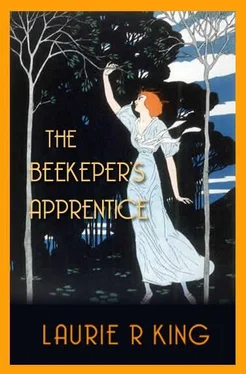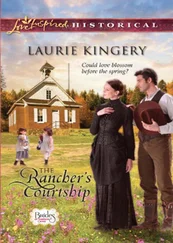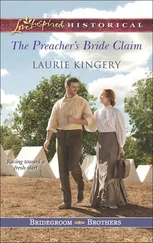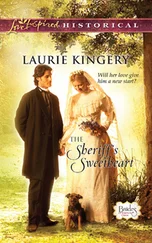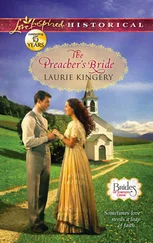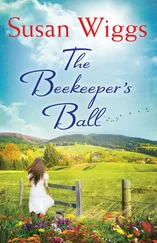Laurie King - The Beekeeper's Apprentice
Здесь есть возможность читать онлайн «Laurie King - The Beekeeper's Apprentice» весь текст электронной книги совершенно бесплатно (целиком полную версию без сокращений). В некоторых случаях можно слушать аудио, скачать через торрент в формате fb2 и присутствует краткое содержание. Жанр: Триллер, Классический детектив, на английском языке. Описание произведения, (предисловие) а так же отзывы посетителей доступны на портале библиотеки ЛибКат.
- Название:The Beekeeper's Apprentice
- Автор:
- Жанр:
- Год:неизвестен
- ISBN:нет данных
- Рейтинг книги:5 / 5. Голосов: 1
-
Избранное:Добавить в избранное
- Отзывы:
-
Ваша оценка:
- 100
- 1
- 2
- 3
- 4
- 5
The Beekeeper's Apprentice: краткое содержание, описание и аннотация
Предлагаем к чтению аннотацию, описание, краткое содержание или предисловие (зависит от того, что написал сам автор книги «The Beekeeper's Apprentice»). Если вы не нашли необходимую информацию о книге — напишите в комментариях, мы постараемся отыскать её.
The Beekeeper's Apprentice — читать онлайн бесплатно полную книгу (весь текст) целиком
Ниже представлен текст книги, разбитый по страницам. Система сохранения места последней прочитанной страницы, позволяет с удобством читать онлайн бесплатно книгу «The Beekeeper's Apprentice», без необходимости каждый раз заново искать на чём Вы остановились. Поставьте закладку, и сможете в любой момент перейти на страницу, на которой закончили чтение.
Интервал:
Закладка:
Shards bounced slowly about the floor. I stared despairingly at the shattered pipe and knelt down to retrieve the pieces, in hopes of glueing it together again. Some of the larger bits had rolled underneath the bookshelf, and I had to lie down to reach them. As I felt around, my hand was suddenly seized, and I shot upright in terror with a fading image of the bookshelf in my mind's eye. It had been a section of history, the titles all on Henry VIII.
I groped for a light and my spectacles and lay back until my cold sweat dried and my heart no longer pounded in my chest. I knew that I could never get back to sleep after that, so I reached for my dressing gown and went to make myself a cup of tea.
In a few minutes I was sitting, inhaling the comforting steam, and thinking about the nightmare. It was very rare for me to be aware of dreams, other than the Dream, and I could not remember having another nightmare since my family had died. What was the purpose behind this one?
Some of its elements were obvious, but some were not. Why, for example, was the hidden blonde both male and female, when I invariably thought of my adversary as female?
The smashed pipe was an easily understood image of my intense, nearing frantic anxiety about Holmes, and bookshelves were such a part of my life that I could hardly imagine any part of me, even a dream, omitting them. But why were the books on history? I held no great passion for recent history, and due to my erratic schooling English history was a relative stranger. What was King Henry doing in front of my eyes? That obscene, gout-ridden old man with his numerous wives, all of them sacrificed to his desire for sons, as if it were their fault and not that of his own syphilitic self. What would Freud make of that dream, I wondered, with Holmes falling beneath the misogynist king, to the echoes of a man/woman's laughter? It was the sort of thing that would have made Dr. Leah Ginzberg lean forward in her chair with a Germanic "Ja, and then?" I sighed into the silent room and reached for my books. If I had to be up at three o'clock in the morning, I might as well make some use of it, Henry VIII or no. I settled myself to work, but all morning the dream kept intruding, and I would find myself staring blankly at the wall in front of me, seeing the spines of those books. Henry VIII. What did that mean?
I worked on, and in the afternoon I went out to take coffee in the covered market before an afternoon lecture, and I ended up ordering a large meal I had not known I wanted until I had walked into the tantalising smell of frying bacon. Two meals, actually, and pudding — more food than I had taken at one sitting at any time since Mrs. Hudson had been feeding me.
Somewhat bloated, I left the market stalls and walked up Turl Street for the afternoon lecture, only to find my steps slowing as I approached the Broad. I stopped. Henry VIII. When in ignorance, consult a library. With few qualms I abandoned the enquiry into Second Dynasty Burial Texts and turned right instead of left. (The familiar loitering and overaged undergraduate behind me emerged from a shop entrance and followed me up Broad Street and past the Sheldonian, but not through the doors of the library.)
I called up several books on the period, but they bore no resemblance to my dream image, and leafing slowly through them caused no bells to go off in my mind. Knowing it was hopeless, I retrieved the photographs, laid them out on the desk in front of me, and it was then that the voice spoke to me, and I knew.
Holmes and I had discussed the possibility that the series was based on a number/letter substitution code, in which, for example, I might be read as A, 2 as B, and 3 1–2 translates as CAB. Extreme complexity — basing the substitution on a key text, primarily — is commonly used to make the translation from number to letter difficult: A long message in such a code can be broken by a bit of fiddling, but for short phrases, one must discover the key. If the key is something external, such as the words on a page of a book, decoding a brief message such as the one we were faced with may prove virtually impossible.
In this case the numerals used were not our Arabic ones, but Roman ones, and as they had not been spaced or had their divisions marked, it was sheer guesswork to know whether there were twenty-five separate numbers, or only seven, or some total in between. That is where Holmes and I had left off, as we could make no sense in the number/letter result we had extracted.
I had to make a few basic assumptions in looking at the problem. First of all, I had to assume that she had left it there for us to see and, eventually, understand, that it was not just a means of maddening us with tantalising clues that led nowhere. Second, I had to believe that the key to it lay somewhere in front of me, waiting to be seen. Third,
I assumed that once the key was found, it would unlock the puzzle fairly quickly. If it did not, I would undoubtedly conclude that this was not the correct key and lay it down again. To give an example, it would call for a boneheaded sort of persistence to unravel the Roman numeral series XVIIIXIIIIXXV through all its possible Arabic equivalents into the numbers 18-13-1-25, and then into RMAY, and then finally to unscramble it to MARY, unless the person already knew what she was looking at. No, the key would not give too much difficulty once it was inserted into the lock. Of that I was certain.
If I was right, the key had been found by the still, small daughter of a voice and laid into my dream for me to find. Henry VIII meant nothing to me, but VIII, or base eight, meant a great deal. If human beings had been born with three fingers instead of four opposing their thumbs, we would count by units of eight instead of tens. A one plus a zero would mean eight, 11 would be how we wrote nine, and 20 would be the same as a base ten sixteen. I wrote it out on a piece of paper, the first twenty-six numbers in base eight with the alphabet underneath:
I 2 3 4 5 6 7 10 11 12 13 14 15 16 17 20 21 22 23 24 25 26 27 30 31 32
ABCDEFGHIJKLMNOPQRSTUVWXYZ
I was left with the problem of dividing up the twenty five
Roman numerals into numbers whose letter equivalent said something. Although I knew them by heart now, backwards and forwards, I wrote them out too as a visual aid: xvxvnxxiixi/xxiixx/vxxxi
Twenty-five numerals, ones, fives, and tens. Taken at its most straightforward, these yielded a series of Hs, Es, and As, which would be meaningless. My job was to divide that string up so that the letters made sense.
I began with the first ten numerals, XVXVIIXXII.
That last / might be attached to the following X to make nine, but I should keep that possibility in mind. XVXVI, or 10-5-10-5-1, yielded H-E-H-E-A, which, unless she wanted to show her derisive laughter, made no sense. Taking the first XV as 15 gave me MHEA. X–V-XVII = 10, 5, 17 gave HEO, which was better than the other. Higher numbers gave the greatest variation of the alphabet. I tried using the highest possible numbers I could get from the twenty-five digits, which divided into 15, 17, 22, 12, 22, 24, 31. In base ten this had read OQVLVX. The 31 was a problem because there are only twenty-six letters. However, in base eight that yielded M-O-R-J-R-T-Y. It took me a moment to realise what I was seeing. My pencil reached out by itself and slowly crossed out the figure 12, substituting 11-1, and there it was. MORIARTY.
Moriarty could not have done this. The professor-ofmathematics-turnedcriminal-mastermind had died at the hands of Sherlock Holmes, hurled over a huge falls in Switzerland nearly thirty years before. Why then was his name here? Was our foe telling us that the purpose behind our persecution was revenge for his death? After nearly three decades? Or was there meant to be a parallel between this case and that of Moriarty and Holmes? I do not know how long I sat there in the Bodleian while the light faded outside, but eventually the little daughter of a voice whispered for one last time, and I heard myself, talking to Holmes in my room on the night it all began. "My maths tutor and I came across some mathematical exercises developed by an old acquaintance of yours, while we were working with problems in base eight theory." And the whispery voice of Holmes in my ears: "Professor Moriarty — "
Читать дальшеИнтервал:
Закладка:
Похожие книги на «The Beekeeper's Apprentice»
Представляем Вашему вниманию похожие книги на «The Beekeeper's Apprentice» списком для выбора. Мы отобрали схожую по названию и смыслу литературу в надежде предоставить читателям больше вариантов отыскать новые, интересные, ещё непрочитанные произведения.
Обсуждение, отзывы о книге «The Beekeeper's Apprentice» и просто собственные мнения читателей. Оставьте ваши комментарии, напишите, что Вы думаете о произведении, его смысле или главных героях. Укажите что конкретно понравилось, а что нет, и почему Вы так считаете.
